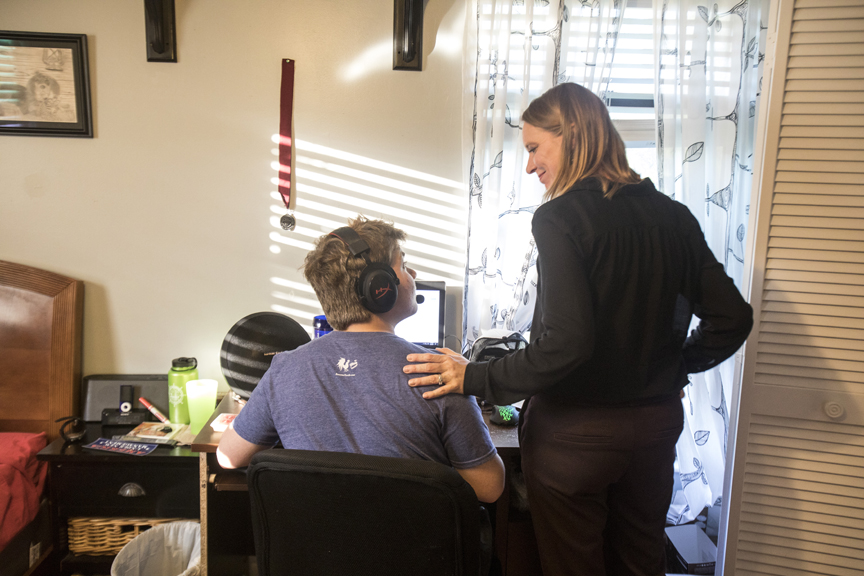- Behavior
- Parenting
- Safety
How can my middle schooler avoid peril in the cyber world?

In this article, you’ll find answers to questions like:
1. How can parents monitor devices?
2. What’s the best approach?
More than one in four middle and high school students report experiencing cyberbullying within 30 days of taking a 2023 survey by the Cyberbullying Research Center. Even texting can turn into dangerous sexting if kids view or send nude or semi-nude photos.
1. HOW CAN PARENTS MONITOR DEVICES?
“Communicating with your child about the dangers of having unlimited access to the internet is crucial to ensure your child’s safety,” says Callahan Walsh, executive director of the National Center for Missing & Exploited Children (NCMEC) Florida Regional Office.
Sameer Hinduja, an FAU professor and co-director of the Cyberbullying Research Center agrees. His organization advises parents to find a low-stress time in the day to open a dialogue and ask thought-provoking questions like, "What is your favorite app?" or "How do you keep yourself safe online?" and "Do you think your school takes online bullying seriously?"
Hinduja shared signs your child may be a victim of cyberbullying. They include: unexpectedly stopping use of devices; avoiding discussions about what they are doing online; appearing nervous when using a device.
Signs your child may be cyberbullying others: quickly switches out of games or apps when you are nearby; gets unusually upset if they cannot use their devices; seems to be using multiple online accounts or an account that is not their own.
2. WHAT’S THE BEST APPROACH?
NetSmartz, a program of NCMEC, has free tips and resources to start conversations, including sensitive issues such as asking if they have ever received a sexual message or naked picture on their cell phones or felt pressured or bullied to send or receive a photo.
“NCMEC’s Florida office provides child protection education and prevention programs, case management services, and exploited child services. They work with the community to provide prevention, safety resources, presentations, Child ID kit events, and other NCMEC resources. Anyone who would like to reach the NCMEC’s Florida office in Lake Park directly can call 561-848-1900 or email flbranch@ncmec.org,” says Walsh.
And if the unimaginable happens, and your child is missing, call 911 and then contact the NCMEC’s 24-hour hotline at 1-800-THE-LOST (1-800–843–5678), located at NCMEC’s regional office here in Palm Beach County.
SOURCES:
Callahan Walsh, Executive Director, Florida Regional Office Development, National Center for Missing & Exploited Children
Sameer Hinduja, Florida Atlantic University and Cyberbullying Research Center
You May Also Like
-
- Behavior
- Education
- Health
Is your middle schooler sleeping enough? And how does it help?
Doctors recommend nine to 12 hours a day for children ages 11 and 12, while ages 13 to 14 should get from eight to 10 hours. Read on for more expert sleep advice. …
Read More -
- Behavior
- Education
- Parenting
How to rein in your rebellious middle schooler by reaching out
It's not unusual for young teens to be a bit unruly as they evolve to independence. The key is to foster communication and teach them they can talk to you about anything. Here's mo …
Read More -
- Behavior
- Health
- Parenting
Empower your middle schooler to decline drugs and alcohol
It may be hard to imagine your middle schooler abusing drugs or alcohol. But peer pressure can really kick into gear in middle school. Read on for tips from our local experts on ho …
Read More
Related resources
-
- Other
- Parenting
- Safety
National Center for Missing & Exploited Children
NetSmartz — interactive website that teaches kids and teens how to make safer choices online
800-843-5678 Website -
- Other
- Safety
Office of State Attorney — Palm Beach County
Local county criminal prosecutors, including information and support for victims of domestic violence, sexual abuse and violent crimes
561-355-7100 Website Email -
- Behavior
- Health
- Parenting
Children's Behavioral Health Collaborative - Palm Beach County
A collaboration of five local mental health agencies that assess and treat children's serious behavioral, emotional or mental health problems
561-244-9499 Website -
- Behavior
- Parenting
Community Partners
Positive Parenting Program, known as Triple P — free seminars and one-on-one guidance to help families improve their parent-child relationships
561-841-3500 Website Email -
- Behavior
- Parenting
Center for Family Services of Palm Beach County
Positive Parenting Program, known as Triple P, offers free seminars and one-on-one guidance to help families improve the parent-child relationship
561-616-1222 Website Email
